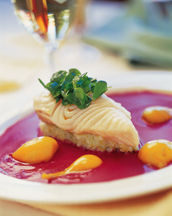 Some people say you eat with our eyes. At Passionfish restaurant in Pacific Grove, California, you do so with your heart — at a place where the local is celebrated, showcased, and conserved. Sometimes, savoring a meal can nurture our body while helping preserve or restore the planet. One day, every meal will be consumed this way.
Some people say you eat with our eyes. At Passionfish restaurant in Pacific Grove, California, you do so with your heart — at a place where the local is celebrated, showcased, and conserved. Sometimes, savoring a meal can nurture our body while helping preserve or restore the planet. One day, every meal will be consumed this way.
While my family and I make every effort to eat local and lower on the food chain — mostly vegetarian – when we travel, we occasionally become “flexitarians” and enjoy a seafood dish or two when we’re at the edge of a vast ocean, perhaps with a wharf at the end of the street. At Passionfish, a restaurant nestled in the scenic Monterey Peninsula just a mile from the Monterey Bay Aquarium, we connected with the Pacific Ocean by both its salty breeze and through the food we savored.
Opening in 1997, Passionfish is the brainchild of Chef Ted Walter and his wife Cindy Walter. Besides being restaurateurs, the Walters’ might as well be called “marine activists.” This dynamic duo have ambitions of changing the world by educating people about what they eat, especially if what they eat comes from the sea. Using their restaurant as the alluring (and delicious) platform, the couple promotes sustainable seafood as well as locally sourced, fresh, organic vegetables and fruits. Even their meat products are pasture-raised.
We were quickly blown away by Chef Walter’s simple, seasonal (the menu changes daily) and sustainable creations, like seared scallop with an artichoke risotto cake and Monterey Bay spot prawn ‘sushi” for starters, tilapia with a garlic balsamic vinegar butter and thyme mashed potatoes or California Sturgeon with coconut rice and sweet potato fritter with red curry vinaigrette for main courses. Their desserts (we tried their mint and espresso mud pie) and wine list reflect the owner’s passions for cuisine — bound to make anyone a believer in the sustainable business movement. They’re ecopreneurs, through and through. Their passion for cuisine and healthy eating parallels their commitment to the environment.
 “We have a fifteen second soapbox to introduce our customers to our sustainability story,” explains Cindy Walter, whose knowledge of the Monterey Bay started when she was very young, having grown up as a fisherman’s daughter. Today, keenly aware of the ecological changes both in Monterey Bay and globally, she’s an ambassador and spokesperson for the sea life on which her business is based.
“We have a fifteen second soapbox to introduce our customers to our sustainability story,” explains Cindy Walter, whose knowledge of the Monterey Bay started when she was very young, having grown up as a fisherman’s daughter. Today, keenly aware of the ecological changes both in Monterey Bay and globally, she’s an ambassador and spokesperson for the sea life on which her business is based.
The Problem, according to Passionfish:
Today our oceans are in serious trouble. Within the past 15 years of industrial fishing we have depleted nearly 90% of our ocean’s large predatory fish according to a report published in Nature, 2003. Worldwide, we remove over 88 million tons of seafood from the ocean each year, according to United Nations Food and Agriculture Organization. To meet consumer demand, several fish high on the marine food chain, such as Pacific Red Snapper (rockfish), shark, and swordfish, are being harvested before they reach reproductive age, resulting in a dramatic decrease in their populations. Habitat destruction, caused by a number of industrial fishing methods, has also contributed significantly to dwindling sea life.
Passionfish’s Solution:
By better managing the harvest of seafood, it is still possible to turn these numbers around in just a few decades. If we all take responsibility for the seafood we eat, by insisting on only sustainable seafood, the plight to save our oceans will be successful. There are plenty of seafood choices that are sustainable.
Approximately, 70% of all seafood consumed in the United States is served in restaurants. Therefore, as restaurateurs, we at Passionfish have a tremendous responsibility. Passionfish sets an example with the strict policy of sustainable purchasing. The commitment also includes the use of organic, pesticide-free produce and low-impact or biodegradable restaurant supplies.
A large part thanks to Chef Walter and Cindy Walter’s efforts, the City of Pacific Grove has revised its grease trap ordinance and adopted a Sustainable Seafood Resolution in 2005 that fosters restaurants and markets giving preference to seafood harvested locally and in sustainable ways. The Walters also advocate for ecologically sound fishing practices through the Seafood Choices Alliance as well as the ban of non-recyclable products.
In 2006, the Monterey Chapter of the California Restaurant Association inducted The Walters into the “California Restaurant Association Hall of Fame,” in recognition of their work. In 2007, Cindy Walter was presented with the “Sanctuary Reflections” Award, by the Monterey Bay National Marine Sanctuary Advisory Council and the Association of Monterey Bay Area Governments for outstanding business practices.
For more information the environmental health of various seafood species, including printable pocket guides, visit the Environmental Defense Fund Seafood Selector and the Monterey Bay Aquarium Seafood Watch websites.
Photography: Courtesy of Passionfish


